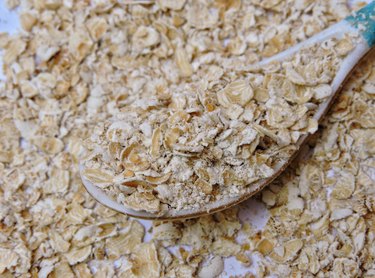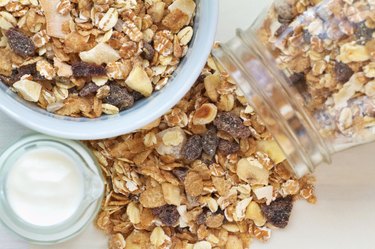
Certain dietary supplements can help you meet your daily fiber requirements, but there's no best time to take fiber unless you're using it to lose weight. What matters most is to eat plenty of fiber daily to reap its benefits and keep your digestive system running smoothly.
Types of Dietary Fiber
Video of the Day
Fiber occurs naturally in plant-based foods. Most fruits, nuts and vegetables contain this nutrient — and so do wheat and corn products, such as whole grains. You have to check the nutrition facts of the food you're eating to get a real sense of how much fiber you consume throughout the day. For example, different fruits provide different amounts of fiber.
Video of the Day
There are two basic types of fiber: soluble and insoluble, according to Harvard T.H. Chan School of Public Health. Both types may help lower your blood glucose levels, improve digestion and reduce bad cholesterol. When consumed as part of a balanced diet, this nutrient may protect against heart disease, type II diabetes and digestive disorders.
Soluble fiber absorbs water in the digestive tract and turns into a gel-like substance, keeping you full longer. Most fruits and some vegetables contain this nutrient. Insoluble fiber is commonly found in whole-grain bread and unrefined cereals. It remains intact in your stomach and helps move food through the digestive system.
How Fiber Benefits Your Health
Oregon State University's Linus Pauling Institute states that the recommended daily fiber intake is 25 grams for women and 38 grams for men. Yet, the average American consumes only 17 grams of fiber per day. Low-carb dieters rarely exceed 10 grams a day.
An April 2017 review published in the Journal of the American Association of Nurse Practitioners states that only about 5 percent of adults meet their daily fiber goals. Chances are, you fall into this category too. Instead of worrying about the best time to take fiber, focus on how much you're getting.
According to the above review, dietary fiber supports digestive health by increasing bowel movement frequency and adding bulk to the stool. Wheat bran and psyllium are two sources of fiber that may help with digestion.
A May 2015 study published in the Journal of Diabetes Investigation has found that eating more fruit and vegetable fiber was linked to a lower risk of diabetes. Berries, leafy green vegetables, yellow vegetables and cruciferous vegetables were particularly beneficial.
Since this nutrient is so important, you should include it in your diet whenever you can instead of plotting out the best time to take it. Eating plant-based foods is better than taking fiber in pill or powder form. Dietary supplements may contain other not so healthy ingredients in addition to fiber. Some brands are better than others, though.
Best Time to Take Metamucil
Metamucil ($23.50, Amazon.com) is a popular fiber supplement containing psyllium husk, among other ingredients. According to the company's website, psyllium husk has been used as a natural remedy for thousands of years. It comes from the Plantago ovata plant, which is commonly found in India. The plants are harvested and the seed husks are ground into a powder used in supplements.
The directions for proper usage of this fiber supplement are listed online and depend on the product you use. If you're taking Metamucil Appetite Control, start with one serving, or 2 tablespoons, up to three times per day. Mix it with 8 ounces of water or other cool liquids.
The best time to take Metamucil if you want to feel less hungry between meals is with breakfast, lunch and dinner. Drinking it during your meal will help you feel fuller.
If you're just using it for general health purposes, take the supplement whenever you want throughout the day. Try to space out your doses to avoid consuming too much at once. You can even take Metamucil before bed if it doesn't upset your stomach.
- Metamucil: "Metamucil Orange Smooth Powder With Real Sugar"
- Metamucil: "What Is Psyllium Husk?"
- Journal of the Academy of Nutrition and Dietetics: "Position of the Academy of Nutrition and Dietetics: Health Implications of Dietary Fiber"
- World Journal of Gastroenterology: "Effects of Cereal Fiber on Bowel Function: A Systematic Review of Intervention Trials"
- Journal of the American Association of Nurse Practitioners: "Fiber Supplements and Clinically Proven Health Benefits: "How to Recognize and Recommend an Effective Fiber Therapy"
- Oregon State University Linus Pauling Institute: "Fiber"
- Harvard T.H. Chan School of Public Health: "Fiber"
- Journal of Diabetes Investigation: "Higher Intake of Fruits, Vegetables or Their Fiber Reduces the Risk of Type 2 Diabetes: A Meta‐Analysis"


